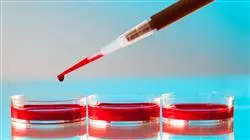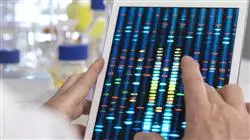University certificate
The world's largest faculty of nursing”
Introduction to the Program
Genomic and precision nutrition is a booming discipline that requires highly trained practitioners in the field"

This Postgraduate diploma details everything a healthcare practitioner needs to know about Nutrigenomics and Precision Nutrition, taking into account aspects related to the laboratory, biostatistics and the current market. Thus, the material is organized in such a way as to advance knowledge without leaving doubts or gaps in information. It is the best specialization on the market, because it offers the opportunity to learn online all the innovation in the field of genomic nutrition, including specific modules on laboratory techniques and statistics.
The program introduces the main and basic points of the human genome, genetic variation and the studies that have been carried out in the field, introducing their designs and their main importance so that the student can follow the following modules. In this regard, the main studies worldwide where genomic nutrition analyses have been performed and results published in the field are included.
Laboratory techniques used in the field of Nutrigenomics and Precision Nutrition are also shown, so the basics will be presented so that the student will be able to recognize and appreciate them once in a laboratory.
And the methodology used in human clinical studies is analyzed, delving into the designs used mainly in nutritional epidemiology. For this purpose, we show how to perform statistical analysis of studies in large nutrition populations.
Finally, the key aspects for the application of genomic nutrition in society, such as legal and ethical aspects, are presented and analyzed. Analyzing DTCs, the role of the healthcare practitioner in the new genomic and big data era, reflecting and analyzing cases from the past, present and anticipating future market developments in the field of genomic nutrition are fundamental aspects of this specialization.
This Postgraduate diploma has the innovation of including practical sections on the current state of the market that offer a realistic, practical and up to date view for the practitioner who needs a 360º vision of the subject. The practical topics help to obtain the necessary critical capacity and deep knowledge of the subject matter for the student to use and apply it in their clinical practice.
This Postgraduate diploma provides students with specific tools and skills to successfully develop their professional activity related to Nutrigenomics and Precision Nutrition.
Get trained in the broad field of Nutritional Genomics and offer specialized treatments to your patients"
This Postgraduate diploma in Nutrigenomics and Precision Nutrition. Laboratory, Biostatistics and Current Market for Nursing contains the most complete and up to date scientific program on the market. The most important features of the specialization are:
- The development of case studies presented by experts in Genomic and Precision Nutrition
- The graphic, schematic, and eminently practical contents with which they are created contain information that is indispensable for professional practice
- Practical exercises where the self-assessment process can be carried out to improve learning
- Special emphasis on innovative methodologies in genomic and precision nutrition, focusing on aspects such as laboratory, biostatistics and the current market
- Theoretical lessons, questions to for the experts, debate forums on controversial topics, and individual reflection assignments
- Content that is accessible from any fixed or portable device with an Internet connection
This Postgraduate diploma is the best investment you can make in selecting a refresher program to get up to date with your knowledge in Nutrigenomics and Precision Nutrition. Laboratory, Biostatistics and Current Market for Nursing”
Its Teaching Staff includes Professionals belonging to the field of Nutrition, who contribute their work experience to this Specialization, as well as renowned Specialists from Reference Societies and Prestigious Universities.
Its Multimedia Content, elaborated with the latest Educational Technology, will allow the Professional a situated and contextual learning, that is to say, a Simulated Environment that will provide an immersive specialization programmed to train in real situations.
This program is designed around Problem Based Learning, whereby the professional must try to solve the different professional practice situations that arise during the academic year. To this end, the professional will be assisted by a novel interactive video system conducted by renowned and highly experienced experts in genomic and precision nutrition: laboratory, biostatistics and current market.
The Postgraduate diploma allows training in simulated environments, which provide immersive learning programmed to train in real situations"

This 100% online Postgraduate diploma will allow you to combine your studies with your professional work while increasing your knowledge in this field"
Why study at TECH?
TECH is the world’s largest online university. With an impressive catalog of more than 14,000 university programs available in 11 languages, it is positioned as a leader in employability, with a 99% job placement rate. In addition, it relies on an enormous faculty of more than 6,000 professors of the highest international renown.

Study at the world's largest online university and guarantee your professional success. The future starts at TECH”
The world’s best online university according to FORBES
The prestigious Forbes magazine, specialized in business and finance, has highlighted TECH as “the world's best online university” This is what they have recently stated in an article in their digital edition in which they echo the success story of this institution, “thanks to the academic offer it provides, the selection of its teaching staff, and an innovative learning method aimed at educating the professionals of the future”
A revolutionary study method, a cutting-edge faculty and a practical focus: the key to TECH's success.
The most complete study plans on the university scene
TECH offers the most complete study plans on the university scene, with syllabuses that cover fundamental concepts and, at the same time, the main scientific advances in their specific scientific areas. In addition, these programs are continuously being updated to guarantee students the academic vanguard and the most in-demand professional skills. In this way, the university's qualifications provide its graduates with a significant advantage to propel their careers to success.
TECH offers the most comprehensive and intensive study plans on the current university scene.
A world-class teaching staff
TECH's teaching staff is made up of more than 6,000 professors with the highest international recognition. Professors, researchers and top executives of multinational companies, including Isaiah Covington, performance coach of the Boston Celtics; Magda Romanska, principal investigator at Harvard MetaLAB; Ignacio Wistumba, chairman of the department of translational molecular pathology at MD Anderson Cancer Center; and D.W. Pine, creative director of TIME magazine, among others.
Internationally renowned experts, specialized in different branches of Health, Technology, Communication and Business, form part of the TECH faculty.
A unique learning method
TECH is the first university to use Relearning in all its programs. It is the best online learning methodology, accredited with international teaching quality certifications, provided by prestigious educational agencies. In addition, this disruptive educational model is complemented with the “Case Method”, thereby setting up a unique online teaching strategy. Innovative teaching resources are also implemented, including detailed videos, infographics and interactive summaries.
TECH combines Relearning and the Case Method in all its university programs to guarantee excellent theoretical and practical learning, studying whenever and wherever you want.
The world's largest online university
TECH is the world’s largest online university. We are the largest educational institution, with the best and widest online educational catalog, one hundred percent online and covering the vast majority of areas of knowledge. We offer a large selection of our own degrees and accredited online undergraduate and postgraduate degrees. In total, more than 14,000 university degrees, in eleven different languages, make us the largest educational largest in the world.
TECH has the world's most extensive catalog of academic and official programs, available in more than 11 languages.
Google Premier Partner
The American technology giant has awarded TECH the Google Google Premier Partner badge. This award, which is only available to 3% of the world's companies, highlights the efficient, flexible and tailored experience that this university provides to students. The recognition as a Google Premier Partner not only accredits the maximum rigor, performance and investment in TECH's digital infrastructures, but also places this university as one of the world's leading technology companies.
Google has positioned TECH in the top 3% of the world's most important technology companies by awarding it its Google Premier Partner badge.
The official online university of the NBA
TECH is the official online university of the NBA. Thanks to our agreement with the biggest league in basketball, we offer our students exclusive university programs, as well as a wide variety of educational resources focused on the business of the league and other areas of the sports industry. Each program is made up of a uniquely designed syllabus and features exceptional guest hosts: professionals with a distinguished sports background who will offer their expertise on the most relevant topics.
TECH has been selected by the NBA, the world's top basketball league, as its official online university.
The top-rated university by its students
Students have positioned TECH as the world's top-rated university on the main review websites, with a highest rating of 4.9 out of 5, obtained from more than 1,000 reviews. These results consolidate TECH as the benchmark university institution at an international level, reflecting the excellence and positive impact of its educational model.” reflecting the excellence and positive impact of its educational model.”
TECH is the world’s top-rated university by its students.
Leaders in employability
TECH has managed to become the leading university in employability. 99% of its students obtain jobs in the academic field they have studied, within one year of completing any of the university's programs. A similar number achieve immediate career enhancement. All this thanks to a study methodology that bases its effectiveness on the acquisition of practical skills, which are absolutely necessary for professional development.
99% of TECH graduates find a job within a year of completing their studies.
Postgraduate Diploma in Nutrigenomics and Precision Nutrition. Laboratory, Biostatistics and Current Market for Nursing
.
Discover the future of nutrition with our Postgraduate Diploma in Nutrigenomics and Precision Nutrition. Laboratory, Biostatistics and Current Market for Nursing at TECH Global University! Get ready to lead the vanguard in the field of health and wellness. Our online classes offer you the opportunity to acquire specialized knowledge from the comfort of your home. Take advantage of the flexibility that online learning provides and adapt your education to your schedule and needs. With online classes, we eliminate geographical barriers so you can access quality education from anywhere. At TECH, we are proud to offer a cutting-edge program that combines genomics and nutrition to give you a complete and up-to-date view of this discipline. You'll learn about the impact of genetics on individual response to diet, and how to leverage that information to design personalized, precision-based nutrition plans. Our experts will guide you through the most recent scientific advances and provide you with the tools you need to apply genomic and precision nutrition in clinical practice.
Genomics and Precision Nutrition.
Specialize in genomic and precision nutrition
.
This postgraduate course focuses on the development of practical laboratory skills and data analysis using biostatistics. You will learn how to interpret genetic test results and use innovative technologies to assess the genomic composition of individuals. You will understand how to leverage this information to personalize dietary recommendations and improve the health and well-being of your patients. In today's marketplace, the demand for genomic and precision nutrition professionals is constantly growing. With our Postgraduate Diploma program, you'll be prepared to lead and make a difference in the field of nutrition. You'll gain the skills needed to work in clinical settings, research settings and in the development of personalized nutritional wellness programs. Don't miss the opportunity to become a leader in genomic and precision nutrition. Join TECH Global University and take the next step in your career - start your path to success today!







